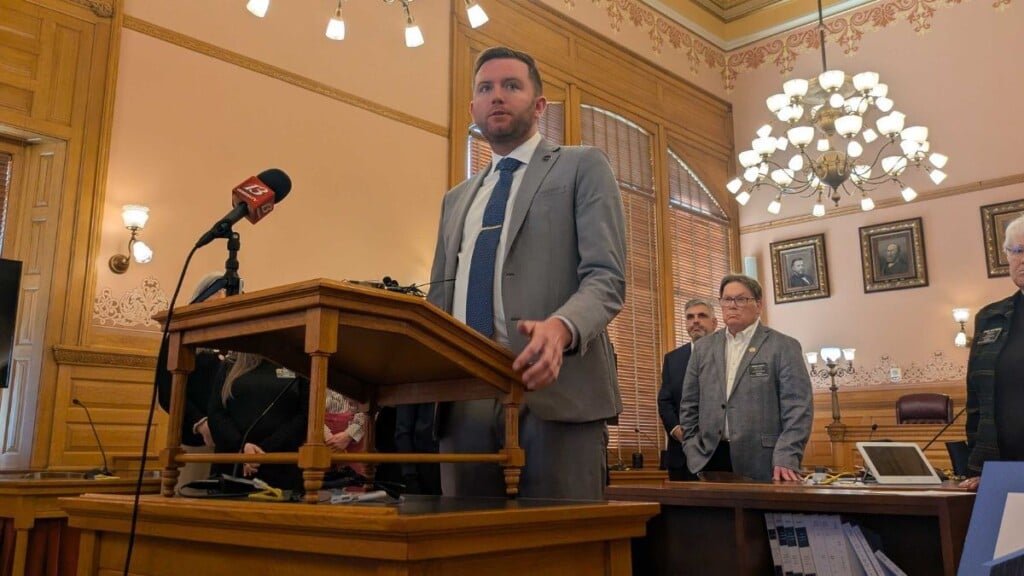The Dolls Are Thriving: Inside the fight for trans liberation in America’s heartland

Transformations Executive Director Merrique Jenson leads a trans history workshop during Liberation Camp in the Ozarks. // Photo by Sean Black
This year alone, state legislatures across the country have considered 948 anti-transgender bills across 49 states, nearly 250 more bills than 2024, according to Trans Legislation Tracker. 118 of those bills have already passed. And it’s only July.
These bills seek to prevent transgender people from receiving basic healthcare, education, legal recognition, and the right to literally just exist. Plus, Missouri is paving the way for homophobes in the Midwest, too, as we sit in third for the most proposed bills in the nation with a whopping 67.
Anti-transgender bills have skyrocketed in the past few years as our state leaders become more and more openly hateful towards people seeking basic comforts of living. Still, amid the escalating antipathy, one organization has emerged as a lifeline for transgender people in the Midwest—particularly trans women of color.
Since 2016, Transformations has been the only trans-led, nonprofit transgender organization operating in the region, founded by executive director Merrique Jenson. Transformations focuses on capacity building and leadership development among trans communities of color in the Arkansas, Kansas, and Missouri regions.
“With everything that’s happening, we are such a unique organization because we’re serving three deeply red states,” Jenson says. “There are not many trans organizations in the country doing that right now.”
What started with a humble budget of $35,000, Transformations has grown into a half-million-dollar organization. Jenson—a multiracial trans woman who began her advocacy work as a young person in St. Louis—seeks to center the voices of the most underrepresented: trans women of color.
“While we serve trans folks, we also have a really deep commitment, of course, to like racial justice and girls that are doing sex work and all these different things,” Jenson says. “We become very specific on what we do, but because we’re the only trans nonprofit, in some way, everybody needs us.”

Transformations leaders Jade Careaga, Kelly Nou, and Merrique Jenson shine in a portrait celebrating trans joy, sisterhood, and leadership in the Midwest. Photo by Sean Black
Organizations supporting transgender people in the Midwest are few and far between, and this region is one of the most entrenched in its hostility towards them. But that’s also the exact reason we need organizations like Transformations.
“There’s just a lot of not necessarily feeling connected to community when you’re from the Midwest, and you’re also a person of color that doesn’t have a lot of other people like you around, but I think that’s also why the mission of Transformations is so important to me; because I believe that trans folks, especially trans people of color, are some of the most resilient people I know,” Jenson says. “Trans folks have existed for a very long time in pretty much every culture of communities of color; trans identities or gender diverse identities exist.”
A core tenet of Transformations’ model is that trans people must be paid for their labor. Too often, organizations seek out trans women to join them but only seek to “compensate” them with the act of representation.
“If it’s something that exists that’s trans, it’s usually not trans lead and it’s usually cis people doing stuff for trans people out of good intentions,” Jenson says. “A lot of times they don’t even pay trans people to do it. They’ll be like, ‘We don’t have anything, but can you, out of the kindness of your heart come run this group?’”
From day one, Transformations refused to follow that norm, even at Jenson’s own personal expense.
“I was paying trans folks out of my own pocket before we even were a nonprofit,” Jenson says. “We believe that our time, energy, labor, and wisdom are really special and unique.”
Transformations now also supports newer groups financially, including the Trans Women of Color Collective KC, which is opening Dee Dee’s House—a transitional home named after Dee Dee Pearson, a Black trans woman murdered in Kansas City 10 years ago.
“If we have the ability to, we’re going to help sustain them,” Jenson says. “Because a lot of them are working off shoestring budgets of like less than $1,000.”
On the rare occasion that a trans voice is included on a news medium, they often only lift up voices of trans white women, omitting stories from the “girls with grit” who are living paycheck to paycheck and facing the unrelenting realities of their oppression.
“The narrative is about this sort of Great Trans Migration of mostly trans white folks fleeing Kansas City, or St Louis, or Columbia because they feel scared and they’re moving to Portland or Seattle or LA or New York,” Jenson says. “That’s a real thing, but that’s also a very specific and privileged thing that not everyone has the ability to do.”

Transformations Executive Director Merrique Jenson and Tre’Shawn Roberts, a community leader and advocate, pictured together in 2024. // Photo by Sean Black
It’s these very same women who are at the most risk. In 2024, Kansas City approved a budget of $2.3 billion, none of which was allocated for programmatic or support services for trans women, despite their frequent requests.
“All the stuff that you might see happening for trans folks is 90% or more being funded by trans people,” Jenson says. “I would say that the trust also trans people have in, like our city, like the mayor, city administration, the Council, has really been strained.”
At the start of this year, the city sent out a survey for trans women to fill out, seemingly a positive step forward to gain some sort of resource allocation. Over 300 women filled it out and as of July, no such resources have been provided.
“We’ve seen that trans folks are easily left behind,” Jenson says. “Now I think it’s a different kind of beast where we’re like, ‘yeah, it’s no more playing by the books or being nice’. Now it’s like, ‘we’re gonna demand for what we need.’”
To help navigate a tumultuous landscape, Transformations frequently joins national summits to discuss issues on a broader scale, such as The Dolls Are Thriving, a celebration and strategy session for trans women of color leaders.
“I think going to national places, having connections with national leaders, being in the national spotlight is really helpful,” Jenson says. “When things happen, we’re able to tap into people that are in different places that have also done really creative things and be like, ‘how did you work through this?’”
Through these strategy sessions, Transformations has formed a community advisory board with representatives from the local, regional level, as well as trans women of color from around the nation. Together, they provide strategic advice, but many of its members also step in to lead training, run programs, and support organizing events.
“They’re not just advisors, and they’re not just strategists,” Jenson says. “They also have the skills to show up and be on the ground.”
One of Transformations’ most unique experiences is its Liberation Camp, a fall retreat for trans youth of color held in the Ozarks. For many campers, it’s the first time they’ve experienced an all-trans space.
“People come and they’re like, ‘I have literally never been in one space ever that has just been for my identity as a trans person of color,’” Jenson says. “That of itself is monumentally liberating.”
The camp is free for participants and includes bonding activities like campfires, swimming, and even a sash-and-merit badge system. Most importantly, it gives the campers a chance to form a bond with women with experiences similar to their own.
“A lot of these kids are learning about themselves online, through social media, through Tiktok,” Jenson says. “While they may know a lot individually about what it means to be trans or how to do their makeup, or how to serve face and be fierce, a lot of times they’re doing that kind of in isolation. They don’t really have a strong sisterhood around them.”
One of the most memorable moments is getting the campers out on the water. Water can often have deep traumatic connections for people of color, and even more so for trans women who don’t feel as comfortable in their bodies yet. But camping deep within a red state doesn’t come without safety concerns. While they’ve never had any incident, Jenson employs every precaution to ensure everyone’s safety.
“I also think communities of color and trans folks often don’t feel safe camping—don’t feel safe going to places that are super backwoods,” Jenson says. “So, in some ways, this is also in defiance to a region or to an area that says, ‘you don’t belong here’, that we’re having such a beautiful experience.”

In November 2023, Transformations led Kansas City’s first city-sponsored Trans Day of Remembrance. // Photo by Evening Star Photography
Jenson sees trans youth not as victims of their political moment, but as some of the fiercest, strongest people in the country. Surviving the Midwest as a young trans person is itself a radical act.
“The beauty of being trans is actually to have resilience,” Jenson says. “Beauty is like having the ability to blow things off and be so set in yourself. For trans young people, part of the journey is to deal with assholes. Some of the hardness that you go through is gonna make you a super fierce person.”
But Jenson also sees a troubling pattern, particularly in how some parents try to shield their children from the realities of being transgender.
“You’re doing your child a disservice, because you’re not going to be around forever, and they need to learn from the adults that they’re going to grow to be,” Jenson says.
What’s often missing is connection; an intentional relationship between trans youth and older trans adults who can become a model of resilience, self-worth, and power.
“I wish that trans folks, trans young people, were more connected to trans adults,” Jenson says. “The best thing we can do is also have more spaces for trans young people and trans adults to learn from each other and to teach each other.”
The world these trans youths will navigate will have no shortage of challenges, but as the tide of anti-trans legislation continues to rise, organizations like Transformations stand firm as a bulwark, rooted in joy, powered by its community, and unapologetically committed to a future where trans people not only survive, but lead.




